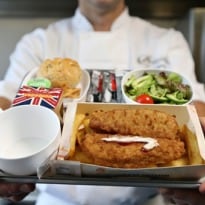Many things are frowned on at 35,000ft. A flying chippie might well be considered one of them. But last week, British Airways threw caution to the wind and unveiled its "Flying Fish and Chip Supper", complete with vinegar and tartare sauce (though sadly no word on mushy peas).
Remarkably, the result has not been the flabby-battered disappointment many surely expected, and - thanks to precision-timed preflight frying - has even earned the approval of Stuart Fusco, proprietor of the legendary Quayside fish and chip restaurant in Whitby, North Yorkshire (Best in Britain at the National Fish and Chip awards). Praise indeed.
It has long been a source of bafflement that, in an era where so many food-obsessed people now travel widely and eat adventurously, in-flight meals have remained so resolutely drab: the little cup of concentrated orange juice, the miserable iceberg lettuce, the ubiquitous tomato-based sauce - and my own personal bugbear: the omnipresent bowl of melon.
Melon is, I suspect, a particular thorn in the side of the vegetarian flyer. There it is as our pudding, in lieu of the giant cake non-vegetarians are served; and then it pops up again, with breakfast. I fly quite often and, over the years, the quality of airline melon has vastly improved - it now retains some flavour, and its texture is no longer perplexingly rubbery. Occasionally, it even comes garnished with a grape. But still its reign confuses me. Isn't there another fruit alternative? What is it about melon that makes it so well-suited to in-flight catering?
Relief may be coming, however, as it appears BA's daredevil fish-and-chip feat is part of a wider overhaul of onboard catering across the airline industry. "More and more airlines are giving food more thought," says Marc Warde, director of Premium Kitchen, part of airline caterers Alpha LSG Sky Chefs, though he is the first to admit the industry has been slow to join the culinary revolution. "I've been here seven months, and it seems quite behind the other areas of the catering industry."
There are some important considerations for in-flight catering. For starters, as Warde points out, as soon as you take to the air, you are thrown into a world of variables. "Chefs do an amazing job on the ground, but then you're at the mercy of the cabin crew who cook the food in the air," he says. "And cabin crew aren't chefs."
And then there are the physiological changes that occur when you fly. "Research has proved that taste buds change at altitude, making it more difficult to appreciate a good meal or wine," explains Jo Austin, editor of OnBoard Hospitality. "Reduced oxygen levels, pressurised cabins and low humidity dry out our mouths and numb the taste buds." This, Austin says, is why many airline caterers are introducing "ingredients that enhance flavours and excite the taste buds ... spices, salts and stronger-flavoured wines. By the way," she adds, "did you know that at 35,000 feet you get drunk three times faster?"
Alpha LSG caters for 75 airlines and has a culinary academy, charged with discovering new ways to make airline food more exciting. "The palate dries out naturally when you're in an aeroplane -- but the food dries out too," Paul Mason, head of the academy, explains. As a result, he has to find food that is well-flavoured but also hydrating. "We're looking for food with the highest umami," he says. "Something that wakes your mouth up." A pot of chia seeds with mango and coconut or almond milk has recently been added to the breakfast menu, "because chia seeds are hydroponic - they release water while you eat them". Another development has been the kimchee slider. Meat travels well, Mason says, but: "Once you've rendered it, you have to char the outside to get any depth of flavour. Essentially, we're looking at ways to improve the taste of food without shoving lots of salt in it."
Of course, not all aeroplane food is the same. "It depends where you sit," says Warde. "Most people sit at the back [in economy] because they don't want to pay for an upgrade." This has implications for the food served. The company recently came up with an idea for an economy meal upgrade, says Warde, "so passengers can spend a little extra to upgrade their food. They'll have a range of options and it will be a bit more foodie. Everything is artisan-produced."
And will there still be melon? Warde laughs. "For most people, melon isn't offensive," he says. "But that's the point - melon is the globally inoffensive fruit. But there are ways of making it more exciting - how is it served? Is it cubes or balls? Can we make it alphonso mango?" And even I wouldn't frown on alphonso mango at 35,000 feet.
BA's Flying Fish and Chip Supper. Photograph: Nick Morrish/British Airways










